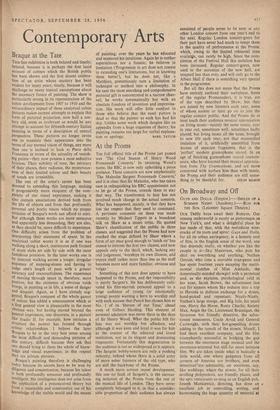At the Proms
THE full official title of the Proms just passed was 'The 62nd Season of Henry Wood Promenade Concerts.' In retaining Wood's name, the BBC is now only upholding a pious pretence. These concerts are now emphatically 'The Malcolm Sargent Promenade Concerts,' and it is clear that, Sir Malcolm, who has taken care in relinquishing his BBC appointment not to let go of the Proms, intends them to stay that way. The transference to him has not involved much change in the actual concerts. What has happened, mainly, is that they have lost the respect that they used to command. A pertinent comment on them was made recently by Michael Tippett in a broadcast talk on Shaw as a music critic. He quoted Shaw's classification of the public in three classes, and suggested that the Proms had now reached the stage defined by Shaw where a form of art once good enough to 'catch on' has ceased to interest the first two classes, and now appeals only to the third, which, lacking any real judgement, 'worships its own illusion, and enjoys itself rather more than less as the stuff becomes more and more familiar, obvious and vulgar.'
Something of this sort does appear to have happened to the Proms, and the responsibility is partly Sargent's. He has deliberately culti- vated his film-starrish personal appeal to a large audience of young (or emotionally young) people wanting a hero to worship and with such success that Punch has chosen him as No. 1 of its 'Heroes of our Time,' ahead even of Gilbert Harding. This element of personal adulation was never there in the days of Sir Henry Wood. What the public felt for him was not worship but affection, and although it was keen and loyal it was for him as the creator of the admired and loved institution, not as its elegant and dominating ringmaster, Fortunately this degeneration in the audience is not so widespread as it appears. The Sargent bobby-soxers are only a pushing' minority, behind whom there is a solid army of more sober listeners of the old type, who are still the backbone of. the Proms.
A much more serious recent development, this one no fault of Sargent's, is the increas- ing isolation of the Proms from the rest of the musical life of London. They have never completely belonged to it, in that a consider- able proportion of their audience has always consisted of people never to be seen at any other London concert from one year's end to the next. Regular London concert-goers for their part have never had much to tempt them in the quality of performance at the Proms, which, owing to the liznited rehearsal time available, can rarely be high. Since the com- pletion of the Festival Hall this isolation has been increased. Regular concert-goers, now used to the acoustics of the new hall, are tempted less than ever, and will only go to the Albert Hall if there is something very special in the programme.
But all this does not mean that the Proms have entirely 'outlived their usefulness. Some of the regular Promenaders, it is true, are of the type described by Shaw, but they are joined by new listeners each year, some of whom sooner or later go on to join the regular concert public. And the Proms do at least teach their audience musical appreciation on living music—mainly the same music, year in year out, sometimes well, sometimes badly played, but living music all the same, brought to new life each year, not that mummified imitation of it, artificially assembled from dozens of separate fragments, that is the 'perfect' modern gramophone record. In an age of finicking gramophone record connois- seurs, who have learned their musical apprecia- tion from The Gramophone, and are more concerned with surface hiss than with, music, the Proms and their audience are still some- thing to be thankful for. COLIN MASON.


































 Previous page
Previous page